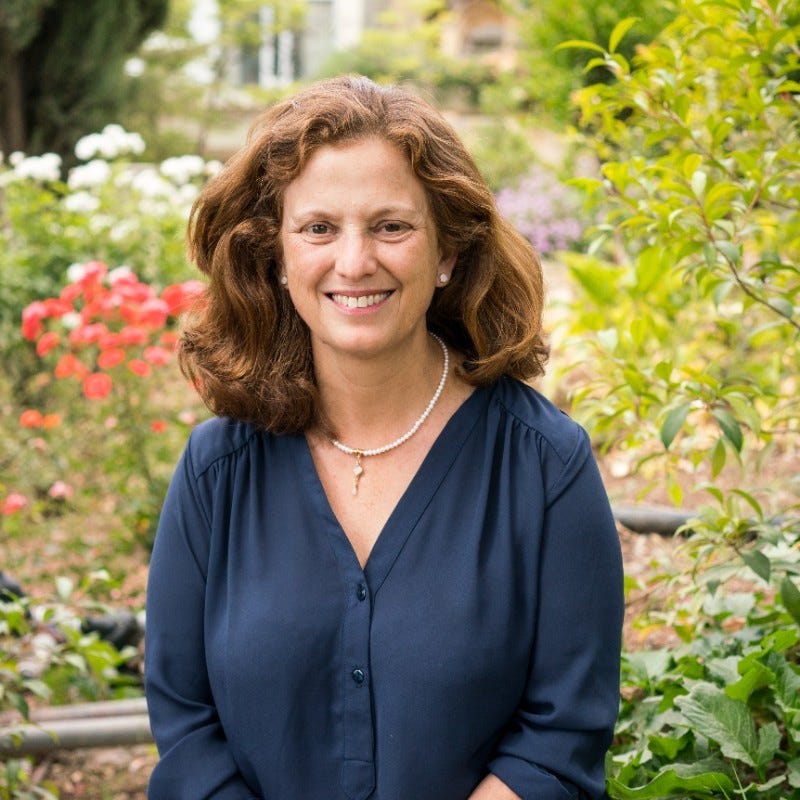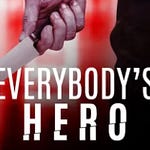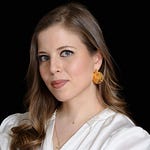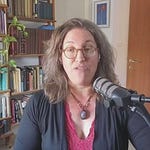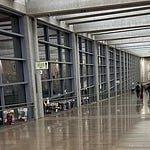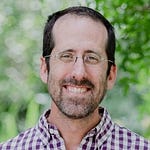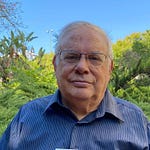It will surprise no one that there’s an entire network of volunteers behind the protests throughout the country. Many of us who live here get constant WhatsApps — if you’ve been arrested, we’re here to help. Contact this number for lawyers who are volunteering to help you. Shaken up after being arrested or harassed by the police? This number will lead you to professionals donating their time to help you through the trauma.
And so it goes. But, it turns out, there’s lots more behind the scenes. I recently began to ask myself how the protests in Jerusalem, where I happen to live, got started. It was obvious that they didn’t sprout out of thin air. How did they come about? A bit of asking led me to Professor Michal Muszkat-Barkan, who, once I saw her photo, I recognized immediately as someone who goes to my shul, and who is one of the leaders of the movement. She kindly agreed on very short notice, just back from abroad, to tell us about the process.
Professor Michal Muszkat-Barkan, Ph.D., is an Associate Professor of Jewish Education in the Parallel Track and the Director of the Department of Education and Professional Development at the Hebrew Union College-Jewish Institute of Religion in Jerusalem. She also heads the Rikma MA program in Pluralistic Jewish Education in partnership with the Melton Center for Jewish Education at Hebrew University.
In addition, Michal is the founder and head of the “Teachers’ Lounge” in memory of Shira Banki , a professional development program for Arab and Jewish educators in Jerusalem. Her fields of research include professional development for teachers and rabbis. She is a teacher in ideologies and pluralism in Jewish education.
Michal obtained a bachelors in Jewish Philosophy and Geography, a masters at the Avraham Harman Institute of Contemporary Judaism from the Hebrew University and holds a Ph.D from the Hebrew University.
Michal was raised in an Orthodox household, her paternal grandparents made Aliyah before the Holocaust and her mother made Aliyah from Argentina.
Today, Michal lives in Jerusalem with her husband. They have four children.
The link above will take you to the full recording of our conversation; below is a transcript for those who prefer to read, available to subscribers to Israel from the Inside.
During this week of intensified protests, both sides are turning up the heat. I haven’t seen this in Jerusalem yet, but here’s from Tel Aviv yesterday, via one of the many WhatsApp groups used to organize and/or monitor the protests.
The protests that have taken over Israel in recent weeks and months are very often in the news as a mass of people. But of course, behind the masses of people are individual women and men who are taking huge chunks of their lives now, normally they would be devoting them to family and to work and to writing and to research whatever they might happen to be doing. And they are taking that time and they are devoting it to making these protests happen. They are part of a large movement of very devoted people. And I thought it would be important at this particularly critical week in Israel when the second and third readings of the first major piece of legislation that may go through are going to come up next week, to speak to someone who was actually one of the main forces behind one set of the protests, which are the protests in Jerusalem where I live and the protests that I happen to be attending.
So, I have the pleasure of speaking today with Professor Michal Muszkat- Barkan who is a professor of Jewish education at Hebrew Union College. She is the director of the Department of Education and Professional Development at HUC JIR in Jerusalem. Her fields of research include teachers’ professional development, teacher ideologies, multicultural teacher training, and pluralism in Jewish education. All of which would be fascinating, actually to talk about some other time. But we're here not to talk about research education, we're here to talk about the protests. And Professor Muszkat- Barkan has been intimately involved and deeply involved in organizing these protests and so forth. So, we're going to hear from her what this is all about. So, Michal, if I can be allowed to call you Michal, thank you for taking the time. And I know you and your spouse just got back from being abroad so that's probably both a cleansing but also a very hard time to be away, I'm guessing. And now you're back and you're back and we are in this critical moment right before the potentially passing of the first bundle of laws about this and you are in the thick of it. So first of all, tell us a little bit about yourself and then how it was that you ended up finding yourself in the core at the helm, in the center of these protests?
Thank you. Actually, I feel that this more than half a year I've been kind of running and it will be interesting to stop for a little and reflect about what we've been doing during this time. So, as you said, my name is Michal Muszkat- Barkan. I'm a professor of Jewish education and most of my career I'm dealing with theory and practice of education, specifically of Jewish education, specifically of Jewish education in Israel. So, I'm aware of the, I would say the burning differences and ideologies in visioning what should be and how we should live our Jewish life in Israel. And in recent years, I've been dealing also with what we call shared education, which means not only to look at the differences in various groups in the Jewish population, but also to look at our population which share with us this country and lives here. So, we need to think, how can we integrate all the differences and all the various groups that live here to vision the future of Israel. But while I was really busy on influencing Jewish education in Israel, even I was part of creating a national curriculum for Jewish education in the state system, I didn't notice how much far are we from educating for democracy. I was assuming that this is kind of agreed.
When you say that “we” were far, is it all of Israel? Is it secular and religious? Is it certain parts of religious? Who's the “we” that's not educating for democracy?
That's a very good question. I think that me and many of my, you know, my kids, where they are educated and they are educated in religious schools, but also my friends and I'm working with secular educational system and with many people, we never talked about democracy. I think it was kind of we assumed that this is the way we live. And in democracy, thinking of pluralism, which I teach as a value, pluralism is the heart of democracy. We need pluralism. We need each of us to have her or his own voice, to be able to influence democracy, to be able to fight on our ideas and thinking, how can this be related with Jewish life. This was my main intention and attention. This was what I was researching and what I was working with my MA students. And so, I assumed that democracy is the best way to lead this country. So, when I say we, I'm talking about basically myself and people that I'm working with. But I see and what I was noticing after this election and after trying to create a revolution in the laws of judicial laws.
And the whole status of the government, the way the government works.
So, I noticed that lots of people believe that democracy or what they call liberal democracy isn't the best way to lead this country. That what we agreed to have, Jewish and democracy state is not what they're dreaming of.
So, when you talk about that, I mean, I want to come back to your role in a minute. But you're in touch with people, friends, family, colleagues, whatever, who live in all different places. Some of them are deep into the very religious world. So, what you're saying now is that it's not that they say, “well, we're going to pass these laws, but it's not going to injure the democracy”. What you're saying that they're saying, if I understand you, is, “no, we actually don't want this to be a liberal democracy, we want this to be something else”. Am I understanding you correctly?
I'm afraid that this is what I'm hearing.
And what's that something else, even if they don't articulate it. What do you think it is?
I'm a religious person, right? And I live according to the halacha. But I don't think that halacha should be the way that we lead in an entire country that has lots of people who does not live their lives according to halacha and Arab people who why should they? And also, we are part of the world. We need to be a country with agreed rules and separation of religion.
So, you think the people on the right who are in favor of these laws that you've been talking to, they actually want some sort of religious state?
Some of their leaders, this is what they say, and I don’t want to…
And what about the actual people that you know on the street?
And also, I don't want to say that these are people on the right because I now in the protest. I see lots of people that are in the right wing politically.
You're very right. This is not right- left, this is not religious secular, this is not even Mizrahi- Askenazi anymore.
This is not what I want to say. I want to say that…
It’s pro- reform and anti-reform.
This is what I'm thinking exactly. I'm starting to hear when they say okay, democracy is right, but not liberal democracy. And I'm not sure what do they mean not liberal democracy.
What's in the liberal democracy? How is it democratic?
So, I think that one really contradiction that is behind this is the contradiction between liberals, and I don't know if I want to say conservative, because…
You have a lot of conservatives here who are opposed to the reform also.
But I want to say I hear a resistance to liberalism. This is what I'm hearing. I'm hearing a huge resistance towards the values of liberalism. And I feel and I'm also a critique about some aspects of liberalism, I feel, and we can talk about that a lot, and it affected my work in my research and my work as educating in higher education. And I feel that pluralism and liberalism took a lead towards a very selfish, atomistic way of life and very…bididut…
Sort of an aloneness…
Aloneness and self-centered education, which I feel it took a wrong direction with these ideas. So, I feel that the resistance towards many of the values of liberalism is part of what's now behind this revolution.
Kind of a return to community…
A return to community, to family, kind of... But I feel that now that I'm so afraid of this revolution, I would say almost the violent revolution, the way that I feel that it's so full with hatred and that try to create, to tell about those who are in a resistance as anarchist as people who hate the country, who don't have any values of their family, of community. I feel that comes also from being afraid of liberalism. So, when they say liberal democracy, I think that they're talking about liberalism.
Well, liberalism is on the defense all across the world. I mean, you can look at Poland and Hungary, which we talk about here a lot because they crossed the threshold and are no longer liberal democracies. But you can see the attack on liberalism in America. Also, there's a very interesting book called “Why Liberalism Failed” by Patrick Deneen. There are many books like that, and there's a whole literature now among political scientists, and it's clear that liberalism is on the retreat in a lot of places throughout the world. And so, this needs to be understood to a certain extent in that larger context. But let's go back to you. So, you live in Jerusalem. You're married, you have a bunch of kids. They're grown, grown kids, but a bunch of kids. And you got a very busy research agenda, and you got a busy life, and all of a sudden you find yourself being one of the people who is behind the protests in Jerusalem, which is a huge organizational project. They don't just happen. When I show up Saturday night, it's very clear there's a plan and there are speakers and there are gigantic screens, and there's a stage, and it's a whole thing, like somebody has put together, like, a different wedding every Saturday night. How does that happen? How does a woman go from being a private citizen teaching in higher education to being one of the people behind the protest? How did this happen to you?
So, after the elections, November 1, I said to myself, oh, my God, it seems as this coalition is going to have lots of power. And I said, okay, so that's a coalition. They should do what they should do. I have to listen to them because I'm pluralistic…
And they were elected.
Okay, they were elected. That's fine. And then they started saying that it's not a right-wing thing, it's not religious and secular thing, but they're going to change the entire way of democracy here in Israel. They're going to dismiss the idea of three…
Three different branches of government.
Yeah, and they're going to weakness our Supreme Court.
They're going to get rid of judicial review. But they didn't say they wanted to change democracy. They just said, we want to change the way the laws speak about the court.
Yeah, but when I heard that, and it wasn't even… I didn't hear that before the elections.
That's the thing that's really important, by the way. I mean, you're a pretty educated citizen, I think. I'm a fairly knowledgeable citizen. We read papers all day long. Bibi Netanyahu did not one time during the campaign say anything about this.
Yeah, he didn't say that. So, I was so surprised, and I said to myself, oh my God, this is breaking all the rules. It's not that they're going to just do work according to their ideology, right wing, religious, okay, but they're going to break the rules. So, if they're going to break the rules, what's the check and balances now? And are we going to have elections in four years or not? So how can I believe that they're going to use the power that we gave them in the right way? Because I read history and I know that some of the leaders who were elected through democratic way when they took much more power, they dismiss their democracy.
You can look at Erdogan, you can look at Putin.
We have many examples. And I know that always when I get to historic comparisons so it's never going to be the same.
Right, everybody says “this is different because…”
I want to say that I was afraid of what's going to happen and that I started feeling in my body that I'm afraid. And as you said before, I'm waking up in the morning, I don't want to read the news because I'm afraid of what's going to happen. Every day a new thing about this idea. And I wasn't aware that that was the agenda. So, I said, oh my God, what can I do now except of just staying in my home and closing my eyes. And one of my friends sent a WhatsApp message saying, “do you want to gather in my home and think about what can we do?” And he's an educator. His name is Guy Schwartz. He was head of a middle school in sabbatical, and he's a friend. And he said, do you want to gather to think? And I said to myself, oh my God, another evening that all of us are going to say, “oh, this is terrible. What can we do?” So, I said, maybe. And I thought I shouldn't go there. I just don't want to see myself wasting another evening talking about the terrible situation. And I didn't answer. And then they sent it again in my shul. And I said I shouldn't go there. And then he called me, and he said, “are you coming? This is tomorrow, and we're going to gather in them matnas [community center].” And I said, I don't know. Maybe. I'll see. And then he called the day after and he said, “please come. I want you to open this evening”. And I said, okay, he is determined to together and we start talking what should be done in this kind of evening. And then I find myself thinking with him. So, I said to my husband partner, I said to him, “Moti, shall we go together?” And he said, “okay, let's go”. So, we went there, and we find ourselves with 50 people which we didn't know before. I was shocked. 50 people in an evening in the matnas [community center].
The one right here?
Right here.
The one next door, literally to where we're sitting. We're sitting in my house, but right around the corner.
Right around the corner. We live in this neighborhood. So, we said okay. And I found 50 people who I didn't know before who also live in this neighborhood. And there were many ages, men, and women. And I remember someone saying, I'm a new immigrant from Russia and Russian people doesn't know what's going on. And a person sitting near to me, she said, I was a prosecutor working and I just retired many people. And here I was opening an evening and saying what I said, and this is something that I feel that in our country we got to believe that if you are more Jewish, you are less democratic, and if you are more democratic, you are less Jewish.
That's what we've come to believe?
Yes. And I feel that we need to break this. And I feel that we need to fight to be able to say we are really Jewish, we are very committed to Jewish life, but we are very democratic people, and we have to fight for this. So, from the beginning I said, it's not only against this revolution, it's for the vision of our country as democratic and Jewish state. And we started thinking, what should we do? And then we said, we believe, first of all, that it's not a right and left thing. It's not religious and secular people. We are all together in this. And how is it? What we feel is it? And then we came up with the name “Safeguarding Our Shared Home”,
“Shomrot v’shomrim al habayit hameshutaf” because we feel this is a shared home and we need to guard it. And from the beginning we said to ourselves, we are going to fight together for this. And this is our main idea. First week, we sent an open invite stationed to a WhatsApp group. And we organized way to travel to Tel Aviv, to Kaplan. We went with a bus to Tel Aviv, two buses only from Jerusalem to Tel Aviv. We went to this big protest. We came home. On Sunday, Guy is calling me and saying, “shall we do in Jerusalem also something?” I said yes. So, he started gathering people.
This is what, like December? January?
January, I think it was January 1. Yeah, right after Levin declared, right after that.
Well, it had to be early in the winter if there was time after Shabbat to get on a bus and get to Tel Aviv because now you can't do that.
It was in the winter, yes. And then we said, okay, so where should we do it? And guys started talking with people and we thought it shouldn't be in Balfour. And I'll come back to that.
Balfour is where Bibi’s house is.
Because it's not against Bibi. It's against the entire idea. So, we thought we need to find another symbol, Israeli symbol and a state symbol. So, we thought we should do it against the president's house because now we feel that this revolution is ruining all the Israeli symbols. So, we need to be there. So, we decided to go in motzei Shabbat to protest there and we decided we should bring flags, and this is what we need to do. And it was on a Friday one of my friends get to an electric shop and bought a microphone system…
Amplification system…
Amplification system. And I went to the shuk to buy flags with a box. So, someone from the shuk brought me the box and we opened a PayBox saying if people want to contribute to kind of expenses…
Right, PayBox is like Venmo. So, for people that are listening, who don't know what paybox is. It's basically Israel's Venmo.
So, we opened this and we said okay. And I'm finding myself in Saturday night with my kids, they're not young, we went to the President's house, someone gave me this microphone and I said so we need to shout something, what should we shout? So, we started shouting “democracy, democracy” and “shalosh rashuyot”, the three different branches of government. And people started getting there. So, we were so shocked that we kind of had 1000 people coming at that evening.
There were 25,000 last Saturday night they said at least.
Yeah, I know, I know I said that, but…
You know is that true?
I think so. We had 1000 people coming and we realized that people really want to come to Jerusalem protest. So I was there with the microphone, giving it to people. I'm a professor of Jewish education, I don't use to shout in the streets. And I realized that most of the shouters are men. So, I was looking for women to shout as well. I was like, “do you want to shout something?” And people were first time. And since then, after that we realized that we need to create this as a huge movement, that we have something to say to the public and that we need to shout it out loud. That protests aren't here to be too polite, it's a protest, we need to shout. So, we decided that we need to bring a stage, that we need to find out who's going to speak on that stage. And from the beginning we decided that we need both men and women, religious and secular, and that we're going to bring people and Jews and Arabs. We want to bring people from all kinds of this society, even though their percentage in the people who are coming will be different.
So, we from the beginning looked for Arabs who are willing to talk. We brought Haredi people who are with us in this protest which their voice isn't heard. We have Haredi friends who are coming to the protest and saying this is something that just create hatred towards Haredi people who want to take part in this country, who want to study core studies, who want to be part of their service and what's going now on this week. I just got a message from a Haredi person who's saying, who showed a picture of one of the protesters with something against the Haredim and he said “why are people are insulting us? We are part of who you are.” So, we brought the Haredi women, we really brought people from Ethiopia, from Russia. We are trying to bring all kinds of people who say that the one thing that we want to say. We need Israel to be a democratic place. So, if you're asking me what does it mean to organize this so, it's volunteering kind of 20 hours a day, it's opening… all this protest is organized via WhatsApp groups and Zoom encounters. We sent out a document asking people do you want to volunteer and for what? And I was sitting in the garden here in Gideon here with Guy looking at what people answered, and we said to ourselves we can't do it, you can do it by yourself. From the beginning we got another friend, name is Eyal Gur and we said okay, we will understand what does it mean to create this kind of protest, but we need lots of people to organize it so, we understand that we need someone to talk with the police and with Magen David…
With the ambulance services.
Ambulance services and to get all the insurance before. We need a person to be the sender of all the WhatsApp announcements. And we need to grow our WhatsApp group so we can have a way to announce what's going to happen. That we need people to work with all the other organizations who are part of this protest because we want everybody to feel part of it, that we want people to work with the students, with youth people. We have a group of youth kids that are in high school. They're now 600 people in their WhatsApp group and we work with them...
A lot of them are coming. You see them at the protests.
Yeah, and we bought them the drums.
Oh, you bought the drums for them?
Of course. You have to think, and we need all these donations because it costs money. So, we created the system. We have now an accountant who is volunteering. She's really part of this protest and she's very devoted to this protest. She's a teacher in a university and she's a CFO in a firm, but she's doing all the accountant things. And we have volunteer people who are sending the receipts to people who are contributing, and we have people who translate to English what we have to say…
So, it's become a very wide group of people that are running it…
It’s a wide group and we have to decide who's going to speak on the stage. So, we have a group that works on this because we have to work with every… we have lots of people asking to talk.
Oh really?
Lots of people. At the beginning, it was hard to find women. From the beginning, we said we need to bring half women. This is who we are. But it was hard at the beginning to find women. Now it's not hard, but I get to see that it's easier for men to be famous. And if we want to bring famous figures, we have much more men than women. But we don't care. We don't bring only famous people. And we try to bring really all the voices, but many groups feel that we don't bring enough of them. So, it's kind of a nice pressure of people that want to feel part of it and want to talk. We have many people who volunteered to talk, which we have to say not yet.
Yeah, two Saturday nights ago, I thought it was very moving. There were three speakers. They were all women. One of them was an Arab woman. She was the sister of Muhammad Abu Khdeir who was horribly murdered by an Arab young man, who was murdered by Jews a few years ago when she read a surah from the Quran.
Yes.
I don't know if you were there. I think you might have been out of the country. It was unbelievable.
We organized that.
I know you did, but I'm just saying it was you could have heard a pin drop. I mean, thousands of people. And this young woman who was clearly very nervous, I mean, she's an Arab woman. I don't know if she speaks Hebrew. It was a huge crowd of people, but it was so unbelievably respectful. And then a woman spoke from Ir Amim. And then you had Tzipi Livni speak. Right. And Tzipi Livni has roots in the Likud.
Sure.
Right. And her parents were hardcore Likud people. So, you had this Arab woman, a relatively left wing Israeli Jewish woman, and Tzipi Livni, all three women. And I actually had a couple of kids from the States who were visiting us that weekend. And I brought them to the protest, and I was kind of explaining to them and I thought it spoke volumes. Arab, Jews, left, right, all women. It's very powerful. I want to focus for a second…. Go ahead, please.
I just want to say that after each of these protests, we have so many reactions. People are saying, “this is last time that I'm coming. You're bringing such left-wing people, so we won't come ever. You just ruin everything. We're going to go to Kaplan”. This is what they say. And then at the beginning we got people saying, “oh, it was too religious. You're just starting to be a religious protest. We will never come again”. So, we got almost every time… “why you brought this Haredi person who spoke about that and that?” So, every time that we got resistance, we say to ourselves, okay, so we are doing the right thing because we really intentionally want to hear voices that we never heard as a society. If there is something that I'm learning now, and I'm sorry, I just interrupted.
No, that's fine.
We have to listen much more carefully to those minorities who want to say something. And as the majority, you think you hear everything, that the system works for everybody, but it's not. So now we are hearing lots of minorities who are saying, before it wasn't right. We need to make a change. We need to do something else in the future. So, if I learned something more in this protest, is that we really need to listen to minorities with their own voice. I can't represent them. They need to represent themselves.
Yeah. Look, I think when somebody writes you and says whether they're left wing and say it's too right wing or they're secular and you say it's too religious or whatever the case may be, the truth is the easiest thing for a person to do is not to write and just not to come anymore. So, when somebody writes you and says, I'm never coming back, what they're saying is, I want to be able to come back. And I'm sharing with you the complexity of this, I think that's actually good news. When somebody writes and says, I'm not coming back because they're saying, I want to come back, and whether you agree with their critique or not is irrelevant.
Also, I want to say that most of the time, we answer.
You do?
Sure. We all answer those people. We get into so many discussions with people. We also have a WhatsApp group who is called Meeting with Safeguarding Our Shared Home, which we brought, we invited people who are in favor of the revolution to speak with us. So, the discussions there are really...
The people who are in favor of the reform?
In favor of the reform.
You want to be in touch with them also?
Also.
That's amazing.
It’s very important to us. And we're doing every week we're doing Zoom encounters.
Yeah, I've been on a couple of them.
Okay. So, you know that we're trying not only to get out and protest, but to learn about the affections of this revolution. So, we bring every week another aspect of this revolution to women, to LGBT, to the economic, to many things. So, we're trying to become a place that we not only protest, but we learn together, and we speak with others.
I actually didn't realize that that was so organized. That's actually very interesting. I want to cover two other things. At least one of them is you've had to make some pretty difficult decisions as part of these protests. So, I'll just say, as somebody who's not involved in them, except for going every week, and I was kibbitzing with you before we started talking, the best thing about going out of Israel these days is that you can actually have a Saturday night and watch Netflix, and you don't have to be feel guilt. I would feel terribly guilty if I stayed home on a Saturday night. So, I'm actually looking forward to this thing being over. Just so Elisheva and I can just put on sweats and watch something stupid on Netflix Saturday night, but all right, that'll come back, for example, when we go to the protests, and we come up from the Marcus side. So, there's a mini protest that we see first, right? And this is the protest of people who have signs that say, “There's no democracy with occupation”. There's a couple of those signs in the main protest, but very few. And it's very clear that this is a separate protest. And I'm guessing that's not by accident.
No.
So, give us an example of how you and your colleagues are embracing people who want to be part of it. I can guess why you would prefer those be two separate protests, but I don't want to put words in your mouth. So, give us a little bit of a sense of the kind of calculations you and the other organizers have to make when you're dealing with people, for example, who have what's I think in Israel considered a fairly left-wing agenda, which is to say there's no democracy with occupation, as long as you have an occupation, it's not democratic anyway.
Okay, so I want to start by saying that part of our group also agrees with this. Some of us are really left wing. Not all of us. Some of us. When I say us, I talk about the organizing group.
Right.
So, we do have people who really believe that there is no democracy with occupation. But we decided that this protest is not about that, even though we bring people to the stage to talk about that, because we have something much more bigger in common with many, many groups. So, our decision is that we are against this revolution, but we are in favor of the creating hascamot or widespread agreements. So, from the beginning, we encouraged the President of Israel to start to try organize these discussions. And we were in favor of this. We were maybe the only protest in Israel who said that out loud, that we are in favor of the discussions.
These are the negotiations that were happening at the President's house for a couple of months, which fell apart.
But we also believe that if this is one of the directions that the country should take, we need to create a system for deliberation negotiation to broader agreements. We believe in that as a way of life for Israel.
Right.
So, from the beginning we said this is what we are in favor. This doesn't mean that all the groups shouldn't believe in what they believe and strive to create, to affect what we have here. So, from the beginning, we had this group that is protesting against the occupation. And they were very vocal, and we said, look, we want you to be part of this, and we believe that you are here because you want to be part of it, but many of our other people do not agree with you. So how can we create this place for you to protest, but also to have people not to feel that if they're coming here, they're part of your protest. So, it was a long negotiation with them, we thought with them, how should we do that? They want to influence the people who are coming. But we said to them sometimes you can influence in a good way and some other times you may influence in a bad way. Like if you are shouting when we sing Hatikvah, or if you're shouting out loud when someone is speaking. So maybe you want to take a farther part, so there you can shout and not disturb to people who want to listen. But we really want you to be part of it. And we also brought people of them to speak on the stage. But they have to understand that they are one of the groups. We have one of the groups of tzionim dati’im.
Right, Religious Zionists.
Religious Zionists. From the beginning they wanted to be noticed as a separate group. So, we said one day they marched to our protest, and we said, okay, we want to welcome the group of tzionim dati’im who are marching now here. So, we have various groups amongst our protests, and we want to welcome all of them. And we want to give them voice. And every time someone wants to speak on the stage, we can't give to everyone because our protesters are very short now in the summer. But we really try to make room for everyone. We do a lot of work behind the scenes, talking. We created a WhatsApp group for all the leaders of these small groups. We have every week a Zoom with them, talking to what they want, what they think. We are negotiating many of their wishes to do things and sometimes there isn't an agreement. It's not easy. It's like creating a coalition of people who do not agree with each other. So, we try to be an umbrella for all these groups and to make a room for all of them. And it's not easy, but it's really important because we believe that this is modeling what we believe should happen in our society.
Right, it's a model for society at large. Is there another kind of difficult decision you've had to make in terms of organizing these protests? Aside from, for example, what do you do with protests against the occupation so that other people will be able to come, other things that people like me who are just attending wouldn't be aware of?
So, part of it was what should we do at the time of the discussions at the President's home? Because people some of our audience said, now we're not coming because we want to give a chance. And we decided that we have to continue protesting because we spoke with people who were inside the house, and they said, “we are hearing you. We need you to be out loud there”. So that was one decision. At the beginning, we had a decision, should we sing Hatikvah or not? At the very beginning, and separately from the protest in all other country, we decided that we should sing Hatikvah. The discussion was because we feel, some of us feel that Hatikvah is an anthem, but it doesn't represent the Arab people. And we said, this is the anthem, so we need to sing it because we want to. And this is one thing that I want to say. This protest reclaims back all the Israeli symbols.
Well, it took the flag back. It took Hatikvah back.
The President’s House, the flag, the anthem, we said…
Took back the idea of Zionism. I mean, it's claimed that we're Zionists.
Yes. This is what really enthusiast me.
Right. Makes you enthusiastic.
It makes me enthusiastic. I'm really excited to see all of my friends, left and right wing, gathering and saying, we love this country, we are loyal to Israel, but we can't live in this way of just ruining what we achieved so far.
Okay, so I want to take this to the future and ask you two different branches of questioning here. So, the first one is we're having this conversation in the middle of July. We're a few days before the Knesset vote, a little bit less than a week before the Knesset vote about the reasonability clause. I mean, the government is getting nervous. The thousands of soldiers now who are saying that they're not going to serve, and the number two person, formerly number two person in 8200, which is the central intelligence unit in the army, and it's an enormous unit of thousands and thousands of people, which is critical, saying that he's not going to serve. And we had on the news on Thursday or Friday, Matan Kahana, who's a former pilot, and Erez somebody other, I think, right, who's himself a former pilot, and he was explaining why he's not training anymore. And Kahana was saying why he is training still. I mean, this is getting… the army is getting sucked into this in a very big way. We know that Herzi Halevi, who's the chief of staff, is getting very nervous about this. Galant is getting very nervous. So, this is coming to a head. None of us know where this is headed. We had Bibi in the hospital this week. They said that he was dehydrated. Everybody knew that that was not true. But that took a few days for it to become clear that it wasn't true, some sort of cardiac moment of some sort. So, four or five days before the vote, is your sense that this is going to pass or it's not going to pass?
So, I want to say I was so surprised by things that happened that I can't say anything about the future. But I want to say that I'm sure that people will go out of the streets. They will continue coming. More and more people during this week to say, you have to listen to us, it's not going to happen, that you're going to vote for this. And we will be silent and say, okay, we accept it. What do you think it's going to happen? I'm asking the government, I'm asking them, look at what's going now in the streets, in the main branches of the country. Do you feel that after you will vote for this, okay, everything will come back? People will keep being loyal, pay taxes and go to the army if they're watching what's going on, and even if they're not watching or listening, something crucial is going on now. So now I think that since we are in a crisis that never happened in this country, even in the biggest wars that we had, they don't have the soldiers to work with in this country.
But I'm going to push back for a second, and I don't know if I'm right or I'm wrong. This is sort of like just for the sake of a chevruta of some sort. But what if I said the following thing… I personally no, it's me, Danny Gordis. I actually am very sympathetic to the soldiers who are saying they're not serving now. Their loyalty to the country is not in any way question. I mean, these are the people that flew airplanes with one engine. If that engine goes, you're in captivity. People who gave their lives, right? And we saw people at the protest a few weeks ago, a woman holding a sign with a picture of her brother. These are people that love this country. So, I'm not one of those people that questions their loyalty. They love this country. And I actually believe that if Hezbollah were to attack, whatever, these people would all show up. I don't have any question about that. But let's hope that Hezbollah doesn't show up and let's hope that Iran stays quiet for now and the borders stay quiet.
There's a part of me that says, you know, there's 25,000 people Saturday night in Jerusalem, and I was at the march last Tuesday where we marched from Tchernichovsky all the way almost to the big bridge. Not quite. And people, a lot of people, thousands of people, I don't know how many people it was. And part of me thinks this is just becoming sort of part of the background. In other words, the government's used to it. They say, yeah, they go out to the streets, they're very polite, they're very nice. Every now and then there's a little conflict with a policeman, but nothing terrible happens. So let them protest. What do I really care? And so, part of me is wondering, is this enough? Are protests of this sort going to be enough? What do we have to turn up the heat? And what does that look like?
Yeah. So, this is the other thing that we now have to decide as leaders of this protest. What does it mean if they keep not listening to what we do? So, what does it mean to make the heat…
Turn up the heat a little bit. What does that look like?
Shall we stop paying our taxes? Shall we don't go to work for many days? Shall we…
Do you think the Histadrut will strike?
I think that what happened last time when Gallant was fired that we had Histadrut and the municipal mayors with us.
Do you think that will happen again?
I feel that when the big systems are going to say we can't now have the trains going, we can't have the airplanes going, the country can't function, someone will need to do something.
So, do you think the Histadrut group would join the protest and strike?
I don't know. I just want to hope for that. And we are going to protest this week in the front of the Histadrut offices. And also, I want to say that several people from this coalition who I thought there are logic people who really are in favor of the entire country and not only to be elected next time. I can't believe and one of them lives here in this neighborhood. I can't believe how come they're not listening?
Well, they may vote no. They may vote no on the next one.
Yeah. So, I hope, and I think that we need to put much more pressure and I want to ask them seriously, “look at our eyes, this is what you want to do to our country?” And I can't believe they will say yes. I really am so disappointed of several of them. Nir Barkat, Dremer, you know how come? Gallant even. They have to say no. I think that what disappoints me about them and also disappoint my Haredi friends about their leaders. We feel that they're not in service of the country, they're in service of themselves. And I really hope that next time they will get punishment from their groups.
For not having stood up?
For not having stand up and taking responsibility. So, what we do now? We take responsibility in ways that we never dreamed that we're going to do, that we never dreamt of. I spoke now with one of our speakers for next week. He's a high-tech person, all the time in his job and we spoke to each other, we never thought that we're going to be going out to the streets. So, one thing that happened to me that I'm getting to meet so many amazing people who stopped everything and just are now devoted to this protest, and this is something new that is happening to this country which we need to use in the future.
Well, that's my last question. So, let's say it works. For whatever reason, the government backs down. It decides to adopt the proposal for constituent assembly, which Professor Netta Barak-Corren and others are pushing forward, and it says, we're going to put it over there, or it makes some compromise, whatever. We figure out something. The army convinces the government that it's too dangerous to have the army fall apart. Bibi’s health problems become an issue. Who knows? Whatever the case may be, let's just assume that something happens, and this dies down. It doesn't mean the problem has gone away. And there is a kind of you're talking about it a lot. There's a kind of a reawakening of a long dormant political force in Israel, which is very heterogeneous. It's got secular and religious and Ashkenazi and Mizrahi and immigrants and natives and young and old and rich and poor. It's really a very wide movement. What happens the day after to convert this into a movement that just doesn't disband and then go back to all the normal disagreements, religious versus secular, immigrants versus natives, etc. Is there a conversation among the leaders about what we do the morning after? Is there a conversation about how we turn this into a political movement that's got a very wide base that will not allow Israel to come back to this space?
There are lots of discussions. It's weird because we are running from week to week, and this week I'm speaking to you one hour. I will tell you later how many WhatsApp messages I have about what's going to happen today, tomorrow, and on motzei Shabbat. So, we are running about this process, but also from time to time, we think strategically what's the next medium- and long-term goals of what we do. And I want to say we have in November municipal elections. So, we are thinking about our influence on those elections in ways that we never thought before, because we need to connect the ability to influence what's going on in the public sphere to what now we see as our responsibility. So, I believe, first of all, that people are not going to stay out of this from now, because people understand that if they don't go to vote, if they don't protest, nothing will happen. And even though the rude, the aggressive people will do what they want to do. So, one thing is that it educates all of us to be loud and clear about what we believe and take responsibility. And I hope much more people will join the ones who are active in this.
Right, but when you come back to politics and you come back to elections, you need a choice other than Meretz and the old Labor.
Sure. So, we are working behind the scenes about that and we are considering what should we do and how to influence to the choices that specifically in Jerusalem we're going to have.
So, it’s on the agenda?
It's on the agenda. It's a midterm goal. We have to now finish this round and then in August we will have to think about that. So, this is one direction, the other one is education. Many of us, the protest leaders, are educators. This is the way we think, and education is the long term running. I'm feeling that if until now, as I said at the beginning, I was dealing with pluralism in Jewish education and what should we do? Now I have to tie much more, the Jewish part with the democratic part and I have to deal much more deeply with the tensions, with the liberal ideas, to the traditional way of life and beliefs. I have to deal much more with this both in my research but also in way I train educational leaders. So, this is something that I'm thinking, not that I have much time to think, but if I have to learn something so this is what I have to learn.
Are you hearing from anybody in the Ministry of Education about the importance of injecting these ideas into the high school curriculum?
Unfortunately, the Ministry of Education is so influenced of political streams
Yeah, but he doesn’t control the rank-and-file people in the office. They could still be talking among themselves about how there's a need to put curriculum in?
Yeah, people can talk, but where does all the resources, where do they come?
So, we need to change the Minister of Education.
We need to be able to influence the way Ministry of Education works with the system. And now we have this Avi Maoz idea that he can control all the groups that influence and get the private groups that influence schools against LGBT and many liberal ideas. And all the time when I work with the Ministry of Education, I fight against these kind of private groups who want to influence and work instead of the teachers, because I do believe in teachers, and I do believe in the system. But I think we have to give the teachers much more room to dream, to bring their values, to become leaders in their own schools, and I believe they can do it. It shouldn't be so politically dictated, and people need to be able to lead according to their sets of beliefs. So, we have several systems of education here. I think we should enable them to do ideologic work and to think farther how to educate the next generation, to be active, to be democratic, to be Jewish and to combine among these ideas.
It's fascinating. There's a ton more we could talk about, but I just think it's really important for people that listen regularly to this podcast to hear the voice of an actual human being behind the mass movement. You see here, 180,000 people were at Kaplan and 25,000 were in Jerusalem, which is great. But there's human beings, there's women and there's men actually giving huge parts of their lives to making this happen and who are also thinking about very critical strategic issues about how the protest movement should be conducted and then how the protest movement should morph itself afterwards into political power to make sure that Israel doesn't come back to this place if we save ourselves from it this time around. So, I know you're crazy busy and you just got back from abroad and you have a ton to do. So, I'm really very grateful that you took the time this morning to share with the listeners a little bit of what you're dealing with. And I wish you success in everything that you're doing, and if not, before, I'll see you at the protest Saturday night.
Thank you very much. Todah rabah.
Impossible Takes Longer is now available on Amazon and Barnes & Noble and at other booksellers.
Music credits: Medieval poem by Rabbi Shlomo Ibn Gvirol. Melody and performance by Shaked Jehuda and Eyal Gesundheit. Production by Eyal Gesundheit. To view a video of their performance, see this YouTube:
Our twitter feed is here; feel free to join there, too.
Our Threads feed is danielgordis. We’ll start to use it more shortly.



